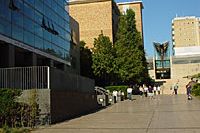Mat Sci and Eng Hons/BiomedEng - 3133
Program Summary
Faculty: Faculty of Science
Contact: School of Materials Science and Engineering
Campus: Sydney
Career: Undergraduate
Typical UOC Per Semester: 24
Min UOC Per Semester: 6
Max UOC Per Semester: 24
Min UOC For Award: 240
UAC Code: 429630
Domestic Entry Requirements: See Domestic Entry Requirements
International Entry Requirements: See International Entry Requirements
Award(s):
Bachelor of Engineering (Honours)
Master of Biomedical Engineering
View program information for previous years
Program Description
This dual degree program is specifically designed for undergraduate students wishing to pursue a career in either Engineering or Biomedical Engineering. Biomedical Engineering is the application of engineering principles to developing technologies and solving problems in a diverse range of health care related fields e.g. implantable bionics, drug delivery systems, medical imaging, radiotherapies, orthopedic devices, telemedicine, robotic surgery, cell and tissue engineering, records management, physical rehabilitation and others. This program is integrated to provide fundamental engineering skills with an undergraduate focus on Materials Science and Engineering and specialist postgraduate level training in Biomedical Engineering.
At the end of the program successful candidates will graduate with a Bachelor in Engineering (Honours) in Materials Science and Engineering and a Masters of Biomedical Engineering. Students are expected to perform at a credit average (65%) or better in their first three years to be permitted to continue with the Masters part of the program. Students who do not satisfy this requirement can revert to the 3131 Bachelor of Engineering (Honours) in Materials Science and Engineering program.
Program Objectives and Graduate Attributes
Program Structure
Students should refer to the program structure information of the 3131 Materials Science and Engineering (Honours) program and the BIOMDS8660 Biomedical Engineering stream for full details on the program requirements of each component.
Students enrolled in this program should note the following:-
- BIOM5910 & BIOM5911 Biomedical Thesis A & B must be substituted for MATS4009 or MATS4010 in the Materials Science & Engineering (Honours) program;
- ANAT2511 Fundamentals of Anatomy (6 UOC), PHSL2121 Principles of Physiology A (6 UOC), BIOM9420 Clinical Laboratory Science (6 UOC), and BIOM9410 Regulatory Req of Biomed Tech (6 UOC) must be completed as part of the requirements for the 8660 Master of Biomedical Engineering program.
General Education Requirements
Academic Rules
Fees
Bachelor of Engineering (Honours)
- Class 1: WAM of at least 80 and Thesis Mark of at least 65
- Class 2 Division 1: WAM of at least 75 and Thesis Mark of at least 65
- Class 2 Division 2: WAM of at least 65 and Thesis Mark of at least 65
Courses will be weighted according to the following:
|
General Education
|
Level 1 Courses
|
Level 2 Courses
|
Level 3 Courses
|
Level 4 Courses
|
|
1
|
1
|
2
|
3
|
4
|
- First attempt counts
- Honours WAM to be calculated to one decimal place
Progression
- No level 4 BE course until 102 UOC of BE program passed
- No level 3 BE course until all Introductory core passed
- If any of the conditions below apply, students will be transferred to the Bachelor of Science program, with such transfer subject to appeal:
- 2 fails in any given core course
- After half or more of the BE program attempted (more than 84UOC), 50% or more of BE program courses have been failed
- Prior to the final 48 UOC of the BE program, a WAM of less than 55%
Substitution
Industrial Training
Professional Recognition - Engineers Australia
Engineers Australia has its national headquarters in Canberra and functions through a series of divisions, the local one being the Sydney Division. Within each division are branches representing the main interests within the profession, e.g. civil, mechanical, electrical, engineering management and environmental engineering.
Students of an approved school of engineering may join the Institution as a student member (StudIEAust). Student members receive the monthly publication Engineers Australia and for a small fee they also receive The Transactions which contains articles on a particular branch of engineering.
Student members are invited to participate in the Excellence Award for Work Experience, the National Young Engineer of the Year Award and to avail themselves of other Engineers Australia services including the Mentor Scheme and industrial experience guidance.
For more information and membership application forms, contact Engineers Australia, Sydney Division, Level 3, 8 Thomas Street, CHATSWOOD NSW 2067 - telephone 02 9410 5600 www.engineersaustralia.org.au
Faculty of Science Rules
Area(s) of Specialisation









